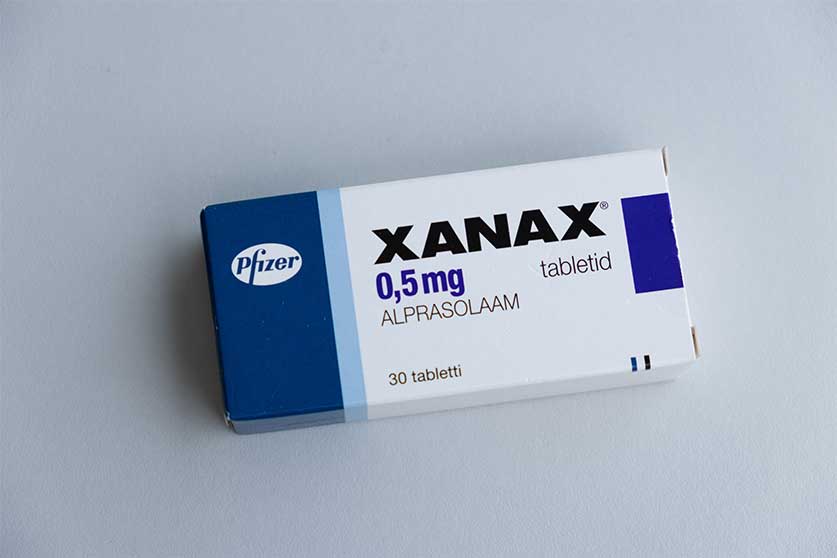Xanax Dosage | .25 mg to 3 mg | XR & ER

Medically Reviewed By: Manish Mishra, MBBS
Xanax can be prescribed in a number of ways according to the National Alliance on Mental Illness (NAMI). Xanax tablets are available in 0.25 mg, 0.5 mg, 1 mg, and 2 mg options. Xanax XR, the extended-release tablet, offers the same options as well as a 3 mg tablet.

Xanax (the brand name for alprazolam) is a drug used to treat panic disorder (with or without agoraphobia) as well as generalized anxiety disorder (GAD).
Xanax helps to control panic attacks by depressing the central nervous system (CNS) and interacting with the gamma-aminobutyric acid (GABA) receptors in the brain, producing a calming effect and sedation.
Xanax Dosage & Prescriptions
Xanax can be prescribed in a number of ways according to the National Alliance on Mental Illness (NAMI). Xanax tablets are available in 0.25 mg, 0.5 mg, 1 mg, and 2 mg options. Xanax XR, the extended-release tablet, offers the same options as well as a 3 mg tablet.
In addition to this, Xanax is available in liquid form, known as alprazolam Intensol. The dosage form of the drug prescribed by your healthcare provider should be taken as directed.
This prescription drug is a benzodiazepine and a Schedule IV controlled substance according to the Drug Enforcement Administration (DEA), which means it has some potential for abuse.
Taking & Storing Xanax
Xanax has a half-life of 11 hours which means those abusing the drug may experience memory impairment and may take more of the drug without realizing they are taking higher doses. This can create life-threatening problems such as overdose.
Those taking Xanax for the first time should be cautious of adverse reactions. Those with a benzodiazepine hypersensitivity may have a contraindication with Xanax.
If you experience adverse effects after taking a certain dose of Xanax, contact a healthcare professional immediately. If adverse effects occur, your doctor may consider a dosage reduction.
Because Xanax is a controlled substance, it’s important to follow the medication guide on the bottle. The drug must be stored at room temperature and should be kept out of reach of children.
Drug Interactions
A number of drug interactions can occur when Xanax is taken with other medications. CNS depressants such as opioids and other benzodiazepines should be avoided. Examples of benzodiazepines to avoid include diazepam (Valium), lorazepam (Ativan), and clonazepam (Klonopin).
Supplements and vitamins should also be avoided until speaking with your primary doctor. A person taking Xanax should not use antidepressants unless instructed by their healthcare provider.
Some of the examples of antidepressants to avoid include:
- fluvoxamine (Luvox)
- fluoxetine (Prozac)
- sertraline (Zoloft)
- nefazodone (Serzone)
- selective serotonin re-uptake inhibitors (SSRIs)
- serotonin and norepinephrine re-uptake inhibitors (SNRIs)
Certain antifungals should also be avoided, including itraconazole (Sporanox) and ketoconazole (Nizoral). Specific medications to avoid also consist of carbamazepine (Tegretol), cimetidine (Tagamet), and certain oral contraceptives.
Contact your local Ohio doctor to receive medical advice regarding Xanax or information on any of the other medications mentioned above.
Breastfeeding
Women who are pregnant or breastfeeding should also avoid benzodiazepines. Through the lactation process, a child may receive unknown amounts of the drug. This may result in a withdrawal syndrome or serious, life-threatening side effects.
Side Effects Of Xanax
While Xanax may prove to be beneficial for those suffering from anxiety disorders, it can ultimately cause a number of short-term and long-term side effects.
Short-Term Side Effects
Some of the short-term effects of alprazolam may consist of:
- sedation
- difficulty concentrating
- drowsiness
- lightheadedness
- fatigue
- dry mouth
- memory impairment
- constipation
Long-Term Side Effects
The use of benzodiazepines for a prolonged amount of time can lead to serious side effects.
According to the United States Food and Drug Administration (FDA), long-term use of Xanax may result in:
- psychological or physical dependence
- sexual dysfunction
- menstrual irregularities
- seizures
- weight gain
- mania
When abrupt discontinuation of Xanax occurs, a person may experience withdrawal symptoms. Symptoms of Xanax withdrawal may include mental health problems such as anxiety, insomnia, and a decrease in appetite.
Xanax Overdose
If a person participates in benzodiazepine drug abuse, an overdose can occur.
Those suffering from a Xanax overdose may experience life-threatening symptoms such as:
- respiratory depression
- excessive sleepiness
- confusion
- loss of consciousness
- slow reflexes
- difficulty with coordination
- coma
Find Addiction Treatment Today
If you or a loved one live with Xanax addiction, contact us today for information on our inpatient treatment options.
- Drug Enforcement Administration (DEA) https://www.dea.gov/sites/default/files/2020-06/Benzodiazepenes-2020_1.pdf
- Food and Drug Administration (FDA) https://www.accessdata.fda.gov/drugsatfda_docs/label/2016/018276s052lbl.pdf
- Journal of Addiction Medicine https://www.ncbi.nlm.nih.gov/pmc/articles/PMC5846112/
- National Alliance on Mental Illness (NAMI) https://www.nami.org/About-Mental-Illness/Treatments/Mental-Health-Medications/Types-of-Medication/Alprazolam-(Xanax)
- National Library of Medicine: MedlinePlus https://medlineplus.gov/druginfo/meds/a684001.html

